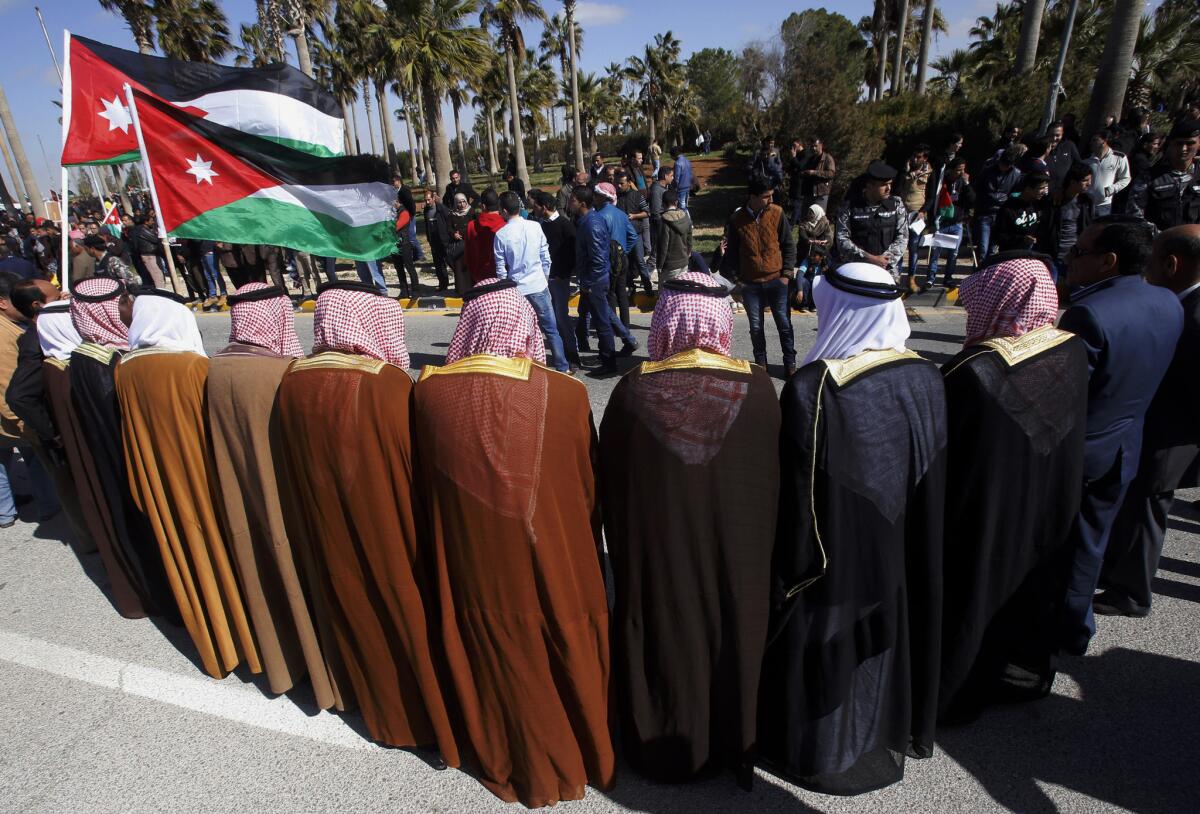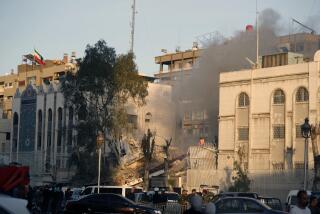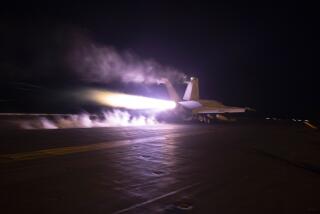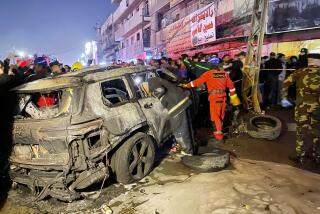Jordan’s jets strike Islamic State targets to avenge pilot

Jordanian F-16 warplanes struck Islamic State targets Thursday in retaliation for the gruesome slaying of a military pilot, officials said, signaling an apparent escalation of the kingdom’s role in the U.S.-led coalition against the militant group.
“The eagles of the royal air force executed several strikes against the lairs of the terrorist Daesh organization,” state TV reported, referring to the militant group by its Arabic acronym.
In a statement, the Jordanian army said that “tens” of air force planes attacked various Islamic State targets, including training centers and weapons and ammunition depots. The airstrikes were conducted “in loyalty to our martyr hero,” the statement said, referring to the slain Jordanian pilot, Lt. Moaz Kasasbeh. All of the aircraft returned safely, it said.
Jordan is a member of the U.S.-led coalition that officials say has conducted more than 2,000 airstrikes on Islamic State positions in Iraq and Syria since August. The coalition Thursday reported airstrikes in Syria and Iraq.
The strikes came two days after a video was released showing the brutal slaying of Kasasbeh, 26, who was taken prisoner by Islamic State when his plane crashed in December in militant-controlled northern Syria. The pilot, a national hero in Jordan since his capture, was shown in the video being burned to death in a cage last month. He was on a mission as part of the U.S.-led bombing campaign when his plane crashed.
Jordanians have reacted with shock and revulsion to Kasasbeh’s slaying, with King Abdullah II promising harsh retribution.
Amman announced the executions Wednesday of two militants long held on death row. Thursday’s reported attack would appear to mark the next stage of Jordan’s vow to strike back forcefully against Islamic State, an Al Qaeda breakaway group that controls territory in neighboring Syria and Iraq.
On Thursday, state television reported that the fighter jets that bombed the Islamic State targets would fly over the Jordanian capital as well as over the southern city of Karak, home to the influential tribe whose members included the pilot.
Abdullah visited Karak on Thursday, paying his respects to the tribe.
Speaking to Kasasbeh’s father and accompanied by a coterie of high-ranking government officials, Abdullah declared that Moaz Kasasbeh’s name would remain printed with pride “in the book of the nation and the hearts of its sons.” He also said that “the war on terrorism is ongoing” in defense of the Muslim religion as well as Jordan and its people.
Safi Kasasbeh has called on Jordan to “annihilate” Islamic State, and other family members also called for vengeance. The father expressed satisfaction with the airstrikes against the militant group.
“God willing, we will end their existence in Syria,” he told reporters.
Tribes are a crucial part of Jordan’s governing structure, providing key support to the monarchy. Kasasbeh’s clan appears to have rallied around government actions and welcomed the king’s plan to ramp up attacks against Islamic State.
But the strategy can also be a dangerous one for Jordan, which is home to many Islamic militants, including supporters of Islamic State and Al Qaeda.
In addition, the kingdom is a gateway for militants headed to Syria to join groups fighting there. Extremists have previously targeted Jordan in bombings and other attacks.
Along with Jordan, three other Arab nations — Saudi Arabia, Bahrain and the United Arab Emirates — have participated in the attacks on Islamic State in Syria, U.S. officials say. The Emirates pulled out in December after the pilot was captured, apparently out of concern about the safety of downed air crews.
None of the other Arab nations has publicly indicated any intention to withdraw from the coalition. U.S. officials regard the presence of Arab nations in the bombing campaign as key to underscoring that the mission is not just a Western operation.
Special correspondent Bulos reported from Amman and Times staff writer McDonnell from Beirut.
Follow McDonnell on Twitter at @mcdneville for news out of the Middle East
More to Read
Start your day right
Sign up for Essential California for news, features and recommendations from the L.A. Times and beyond in your inbox six days a week.
You may occasionally receive promotional content from the Los Angeles Times.






